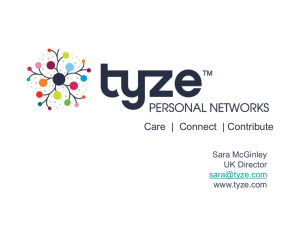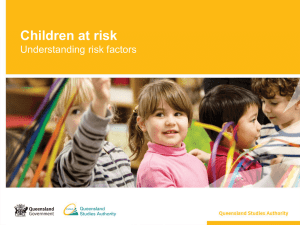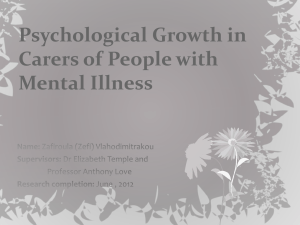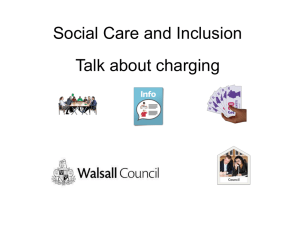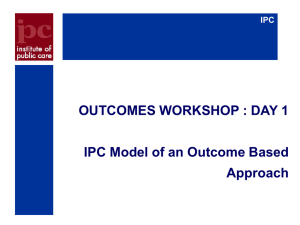Conference power point presentations
advertisement
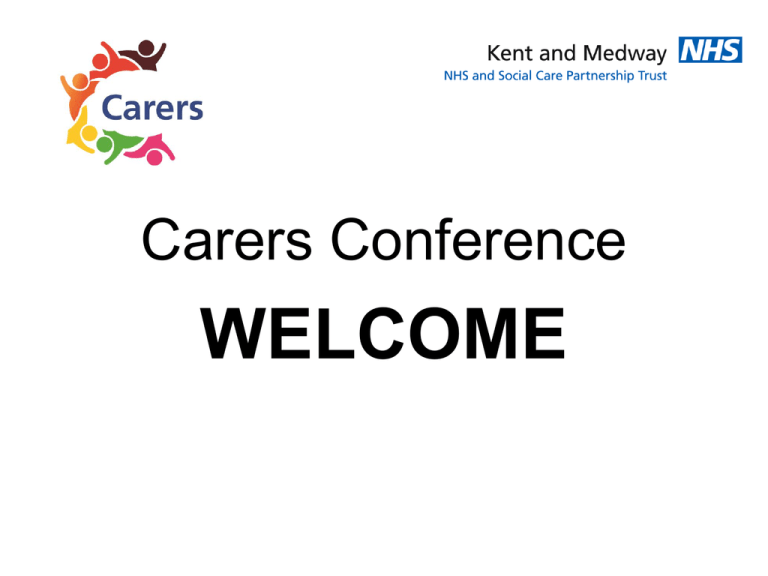
Carers Conference WELCOME Why are we here today? “Hands up” - key concerns Risk Assessment Urgent Care Crisis Beds We want to listen: - you experience service issues day and night - you know what’s working, and what’s not We want to: - agree the priorities - agree how to work together (better) - agree how to communicate - agree how to meet and how to monitor progress Summary - We recognise the worries - We want to work together - We can achieve more together - We need you Malcolm McFrederick Executive Director of Operations - Website - Single Point of Access - A&E Liaison - Crisis and Home Treatment Teams - Beds and Alternatives Clinical Risk Development Dr Catherine Kinane Medical Director We have a new process for clinical risk assessment and management which benefits from: 1 A focus on suicide prevention 2 Being organised as a 3 tiered process, so that low risk is dealt with simply and greater risk/risk complexity is explored more thoroughly 3 Compatibility with the RiO Risk Summary, the primary patient record for recording clinical risk 4 Understandable by practitioners and patients 5 Readily lending itself to clinical risk assessment and management training Tier 1- suicide risk SAFE-T (Suicide Assessment Five-step Evaluation and Triage) American Psychiatric Association practice guidelines conducted at: first contact with the patient; following any suicidal behaviour; with increased suicidal ideation; with pertinent clinical change; at CPA reviews; at discharge. 1 Identify risk factors 2 Identify protective factors 3 Conduct suicide inquiry 4 Determine risk level/intervention 5 Document assessment, intervention and follow-up Tier 1- suicide risk SAFE-T characteristics - Guides professional clinical engagement, enquiry, reasoning and action - Not a “tick box” exercise - Does not produce a “score” - Easy to understand and apply Tier 2 - suicide risk Asking about suicidal ideation and intent Tier 1 - Risk of neglect Tier 1 - Risk of aggression/violence Tier 1 - Other risks Tier 2 - Other risks asking about ideation and intent to commit violence or ‘other’ risk Tier 3 - Complex risk assessment and management If clinical uncertainty about risk persists, conduct detailed, multi-disciplinary risk assessment using Trust approved risk assessment instrument described in our policy. Consider multi-disciplinary meeting on risk assessment and management. The outcome is recorded in the RiO Risk Summary. Trust Developments Web Based Incident Reporting is coming KMPT is rolling out Datix Web, an online incident reporting system to replace its current paper based IRIS forms - Instant Feedback for Staff - Quicker & Easier to use - Improved Reporting - System Design Led by Clinical Staff - Ability to meet Regulations / Statutory Requirements - Reduction in Costs - Real Time Information Available Discussion Angela McNab Chief Executive Feedback Angela McNab Chief Executive Open Dialogue Peer Support Catherine Kinane Amanda Francis Annie Jeffrey Background Open Dialogue is a concept developed by Dr. Jaakko Seikkula. There has been significant take up around the world, including Scandinavia, Europe and the USA Optimal principles for organising psychiatric treatment 1. Immediate response - first meeting within 24 hours after contact 2. Social networks perspective - involvement of the client’s social network and all the professionals involved in the actual crisis 3. Tolerating uncertainty - generating a process for the new conversational community to ‘live’ and talk together 4. ‘Dialogicity’ - increase understanding about the actual crises and the life of our customers Benefits and strategic fit Open Dialogue will support our Clinical Strategy, helping to prevent admissions and ensuring we are recovery focused. Improved prognosis/outcomes Reduction of symptoms Longer term relapse rates Open Dialogue will support our Commercial Strategy, which aims to ensure that the Trust can grow into new markets. Participation in national network Attainment of a multidisciplinary workforce trained in OD techniques Open Dialogue will enable us to deliver our Financial Strategy, supporting long term viability and sustainability. Cost savings from lowering long term use of community services Reduced medication use Reduced bed occupancy Working together Angela McNab Chief Executive Steve Inett Chief Executive Healthwatch Kent Healthwatch Kent Who are we? We are the consumer champion for health & social care Our aim is to improve services by ensuring local people’s voices are heard FREE Information & Signposting service 0808 801 0102 info@healthwatchkent.co.uk Mental health We’ve heard loud and clear from the mental health community We’ve undertaken a number of projects Enter & View visit to Little Brook Hospital Gathered experiences of patients and families who were moved from Medway into Kent Gathered experiences of the CAMHS service Mental health carers All these reports & our recommendations have been published Mental health carers Gathered experiences of mental health carers Used our findings to facilitate a meeting with carers, providers and commissioners to discuss how we can move forward We all agreed some key points that would benefit everyone. An action group is now taking these forward Mental health carers : key actions Improving communications Establishing a county wide forum for carers to create an effective platform to raise your voice Agree a Carers Charter with KMPT Training for staff on the needs of carers Training for carers on how to support their loved ones Overcoming the barriers that confidentiality can cause for carers How can you get involved? • Sign up for our monthly newsletter • Complete a Speak Out form – tell us your experience • Follow us on Facebook/Twitter • Apply to be a volunteer Contact us Freephone 0808 801 0102 info@healthwatchkent.co.uk @healthwatchkent hwkent THANK YOU FOR YOUR TIME ANY QUESTIONS? Sarah Russell Operations Manager Healthwatch Medway Angela McNab Chief Executive Thank you for joining us

